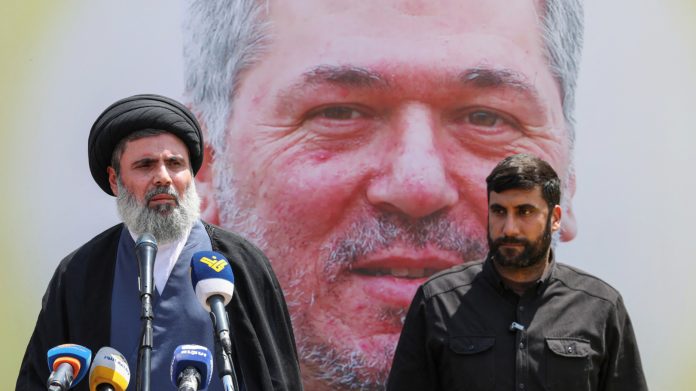15 Jun. 24: Israel’s assassination of a top Hezbollah field commander on Tuesday has raised, once again, concerns over a wider Israeli war in Lebanon after months of clashes. Hezbollah, the powerful Iran-backed Lebanese movement, fired over 200 missiles into Israel in retaliation and has vowed to intensify its attacks following the killing of Taleb Sami Abdallah, reports Middle East Eye.
These developments are just the latest in escalating hostilities, which have seen increasingly ferocious and sophisticated Hezbollah attacks on Israel. The change in the scope of Hezbollah’s attacks when compared to the early weeks of the conflict has caught many observers’ eyes.
Following the 7 October Hamas-led attack on Israel and subsequent war on Gaza, Hezbollah began skirmishes along Lebanon’s southern border in solidarity with the Palestinian enclave and to relieve pressure on Hamas.
Since then, the Lebanese movement has proven itself capable of downing several advanced Hermes 900 drones, firing anti-aircraft missiles against Israeli jets, which it claims forced them to retreat, and even carrying out a symbolic strike against an Iron Dome air defence unit.
“Hezbollah is becoming more audacious, and I think the Israelis are surprised by this,” said Amal Saad, a Hezbollah expert and lecturer in politics at Cardiff University.
“They know what it has, its arsenal, but they didn’t think it would have the audacity to use them, at least not for Gaza,” she told Middle East Eye, suggesting that Israel expected the Lebanese movement to reserve such weapons for a direct war with Lebanon.
This escalation, experts say, is likely linked to the political deadlock over Gaza ceasefire negotiations.
On 31 May, US President Joe Biden presented what he called an Israeli ceasefire plan, which shares similarities with a proposal accepted by Hamas weeks ago. Israel, however, refuses to sign up to any proposal that definitively ends the war, something Hamas insists on.
While the West and Israel hope pressure on Hamas will prompt the Palestinian movement to concede to their demands, experts say Hezbollah is using its own tactics.
Mustafa Asaad, a weapons expert based in the US, told MEE: “The political situation and the deadlock we are having at the moment means the only way to be heard is to show that you have an advanced capability, without starting a global, final war.”
Saad agrees, adding that the ongoing Gaza ceasefire negotiations may have encouraged Hezbollah to apply more pressure.
“Hezbollah has tied closing down this front to ending the war on Gaza,” she said. “The idea is to pressure Israel to concede to the proposal.”
Saad says Hezbollah is trying to raise the price Israel would have to pay should it not sign a deal with Hamas.
“That cost would be that the northern front would be on fire, and that Hezbollah would be much more brazen in its attacks, use more sophisticated weaponry and start showcasing more of its weapons, like the anti-aircraft weapons it started using last week and this week,” she said.
Drone and missile attacks from Hezbollah have caused wide-ranging fires in northern Israel over the past weeks, infuriating top Israeli officials. Similarly, Israeli attacks on southern Lebanon have burned large swathes of land, with Israel even seen using a medieval trebuchet to launch incendiaries.
Since Hezbollah and Israel fought a 40-day war in 2006, the foes have traded occasional blows in a manner intended to contain any potential escalation.
During the current round of hostilities, Israeli air strikes on Lebanon have killed over 450 people, including at least 80 civilians. Meanwhile, Israel says that 15 of its soldiers and 10 civilians have been killed.
The Lebanese movement has been staging more brazen drone attacks in recent weeks, while Israel has struck deeper into Lebanon and carried out several targeted assassiations.
Despite this being by far the largest escalation since 2006, it remains within Hezbollah and Israel’s parametres and is yet to spark an all-out war.
According to Asaad, Hezbollah is “not really going all out yet” and the movement’s actions remain “within escalation management”.
Qassim Qassir, an analyst close to Hezbollah, told MEE the group has changed the kinds of attacks it launches “firstly, in solidarity with Gaza and to respond to Israeli aggressions”.
While Hezbollah’s attacks send a message of deterrence to Israel, Qassir said, they are also intended to tell the Israelis that “Hezbollah is ready for any escalation”.




